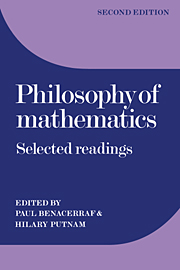Book contents
- Frontmatter
- Contents
- Preface to the second edition
- Introduction
- Part I The foundations of mathematics
- Symposium on the foundations of mathematics
- Disputation
- Intuitionism and formalism
- Consciousness, philosophy, and mathematics
- The philosophical basis of intuitionistic logic
- The concept of number
- Selections from Introduction to Mathematical Philosophy
- On the infinite
- Remarks on the definition and nature of mathematics
- Hilbert's programme
- Part II The existence of mathematical objects
- Part III Mathematical truth
- Part IV The concept of set
- Bibliography
Intuitionism and formalism
Published online by Cambridge University Press: 05 June 2012
- Frontmatter
- Contents
- Preface to the second edition
- Introduction
- Part I The foundations of mathematics
- Symposium on the foundations of mathematics
- Disputation
- Intuitionism and formalism
- Consciousness, philosophy, and mathematics
- The philosophical basis of intuitionistic logic
- The concept of number
- Selections from Introduction to Mathematical Philosophy
- On the infinite
- Remarks on the definition and nature of mathematics
- Hilbert's programme
- Part II The existence of mathematical objects
- Part III Mathematical truth
- Part IV The concept of set
- Bibliography
Summary
The subject for which I am asking your attention deals with the foundations of mathematics. To understand the development of the opposing theories existing in this field one must first gain a clear understanding of the concept “science”; for it is as a part of science that mathematics originally took its place in human thought.
By science we mean the systematic cataloguing by means of laws of nature of causal sequences of phenomena, i.e., sequences of phenomena which for individual or social purposes it is convenient to consider as repeating themselves identically, – and more particularly of such causal sequences as are of importance in social relations.
That science lends such great power to man in his action upon nature is due to the fact that the steadily improving cataloguing of ever more causal sequences of phenomena gives greater and greater possibility of bringing about desired phenomena, difficult or impossible to evoke directly, by evoking other phenomena connected with the first by causal sequences. And that man always and everywhere creates order in nature is due to the fact that he not only isolates the caudal sequences of phenomena (i.e., he strives to keep them free from disturbing secondary phenomena) but also supplements them with phenomena caused by his own activity, thus making them of wider applicability. Among the latter phenomena the results of counting and measuring take so important a place, that a large number of the natural laws introduced by science treat only of the mutual relations between the results of counting and measuring.
- Type
- Chapter
- Information
- Philosophy of MathematicsSelected Readings, pp. 77 - 89Publisher: Cambridge University PressPrint publication year: 1984
- 14
- Cited by

